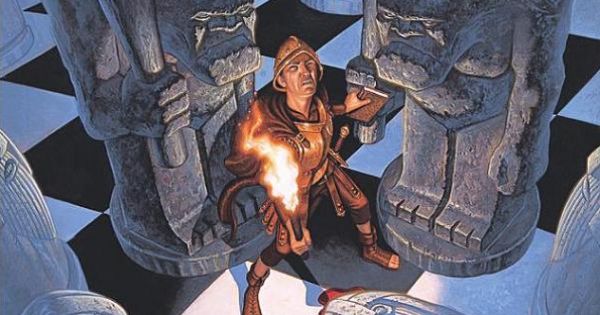It’s been a while since we’ve hung out with Sam Vimes and the Watch, a whole four books ago in ‘Night Watch’. I wonder if the perfection of ‘Night Watch’ made it hard to move their stories on, because what do you do when you’ve written a book so good and then have to write the next one? We haven’t been entirely Watch-less in that time; Vimes made a brief appearance in ‘Monstrous Regiment’ and ‘Going Postal’, as did Carrot and Angua, but they’ve been little more than cameos. I think giving these characters that breathing space has done them good, because here they’re back and it certainly feels like ‘Night Watch’ has had time to settle.
‘Thud!’ focuses on the flare up of old racial tensions as the anniversary of Koom Valley, a battle fought between dwarves and trolls, looms and there’s some inflammatory preaching going on in the streets of Ankh Morpork. It’s been so long since there was any troll and dwarf related drama – way back in ‘Men At Arms’ – that it comes as a bit of a shock. We’ve got so used to the multi-racial Watch that any sort of racism there is quite jarring now. It’s no wonder that as the novel opens, everyone’s nerves are on edge. Once again, this is all sounding very real world familiar, don’t you think? When the death of one of the leading dwarves is discovered and a troll club the weapon, the Watch have to do battle with riots, mystical ancient magic and Vimes’ absolutely unshakeable resolution that he has to be home by six to read his son a story.
I think that my favourite thing about this novel is the checking in that we have with some Watch members who have been a little neglected of late. Fred Colon, who we last saw losing lots of his friends to the barricade in ‘Night Watch’, has a different air to him now, the old soldier who is doing what he can to protect himself and his fellow officers rather than the bumbling fool. Very early in the novel, he and Vimes discuss the buzz, the things that Colon has been hearing on the street about the dwarf murder and the spiralling consequences, and not once does Vimes dismiss what Colon is saying. I’ve always liked their relationship; they’ve been together forever and although Vimes delegates to Carrot, he trusts Fred. Fred is the only one in the Watch who calls him Sam – ‘Gods know he’s earned it’ – and their friendship is so important.
I think though, of all the Watch, my second favourite is definitely Detritus, who has without a doubt has the biggest character development of them all. We’re reminded in this book that Vimes first found him chained to a wall and barely able to speak, and now he’s a trusted sergeant and so loyal to Vimes that it’s heart-warming. He knocks out a young street troll for even daring to suggest that Lady Sybil and the baby could be targets for the street gangs, and he doesn’t even blink. I think the best moment though, a moment between characters who have grown up and have such different concerns now, is when Detritus asks to bring a young troll he is helping with him to Koom Valley. Vimes looks at him and remembers that Detritus is happily married but childless, and consents to the kid joining them. How far they have come since ‘Guards! Guards!’.
The Watch also gets its very first vampire recruit in this novel, in the form of Sally, who immediately puts Angua on edge (it’s a werewolf thing). As so often happens, Sally turns out to be a fairly good egg, and the best scenes in the novel are when she, Angua and Cheery take Nobby’s new girlfriend out on the town. Aside from the witches and the regiment in ‘Monstrous Regiment’, we don’t often get groups of women gathering together in Discworld (especially in Ankh-Morpork) and it is refreshing to see. They drink a spectacularly large amount of interestingly named cocktails and generally have a great time, despite the tension between Angua and Sally, and to be honest I would read several books worth of their adventures.
A last mention here should go to some world-building that made me smile. First off, Vimes is very rude and dismissive about the new stamps and the ‘pea-brained idiot at the Post Office’. I seem to remember he was in the background of ‘Going Postal’ being very disapproving of the whole venture, so this opinion is no surprise, really. There’s also a brief mention at the end of a ‘mechanism’ that, if I am remembering correctly, will surely come majorly into play in ‘Raising Steam’. I think that these little asides and potential plot developments are quite exclusive to the later novels and I for one really appreciate them. It makes the series seem even tighter and more cohesive than it ever was before.
Some of the coverage you find on Cultured Vultures contains affiliate links, which provide us with small commissions based on purchases made from visiting our site. We cover gaming news, movie reviews, wrestling and much more.



